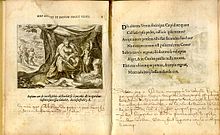Sine Cerere et Baccho friget Venus
Sine Cerere et Baccho friget Venus ( Latin : Without Ceres and Bacchus , Venus falters ) is a Terence quote that was widely used as a proverb and pictorial motif in the early modern era .
saying
The sentence goes back to the love comedy Eunuchus des Terence, where Chremes says to Pythias in the fifth scene of the fourth act (732): verbum hercle hoc verum erit "sine Cerere et Libero friget Venus" ( the word is actually [lit .: at Hercules] true: Without Ceres and Liber , Venus suffers from rigor . So it was apparently already known as a proverb. Chremes uses it to explain why in an amused state, after a copious meal, Pythias suddenly appears much more beautiful than usual. Liber, the son of Ceres and god of male fertilization (and, secondarily, of wine), is later through Bacchus been replaced. The proverb can also be found in a similar form in Cicero , who also cites it as a model for the stylistic device of metonymy . It was later consistently ascribed to Terence.
In the Middle Ages, Caesarius von Heisterbach used it in his work Dialogus miraculorum as a warning against luxury and gluttony and as a call to an ascetic lifestyle. Even Martin Luther quoted it in 1518 in this sense in a sermon on the seven deadly sins . With Renaissance humanism , the proverb found its way into relevant collections on a broad basis, such as the Adagia of Erasmus of Rotterdam . The earliest German version is preserved in a Klagenfurt collection from 1468: In (= without) wine and bread Venus suffers not. Other German variants are:
- Without bread and wine, Venus is dead.
- Without food and drink, Venus is sick.
- Love cannot flourish without food and wine.
Motif
First of all, the image motif is closely linked to the text and is found mainly in emblem books such as the microcosm of 1579. The text makes it clear that the whole thing is to be read as a warning against the dangers of excessive feasting and wine consumption as stimulants of sexual desire:
Say, Cythereian Venus with Cupid: Why
do you warm your feet, warm your hands? Is it
because the eloquent Iakchos is not by your side?
Dusty Ceres isn't there either?
Where there is sobriety, harmful lust freezes
and no wars begin against the Curier.
Wherever there is mighty drunkenness and abundance,
the mother of adultery begins nefarious wars.
The motif became very popular in the late 16th and early 17th centuries, especially in the Netherlands and among the Mannerist artists at the court of Rudolf II in Prague .
An early version as an independent painting is Hans von Aachen's Bacchus, Ceres and Armor , which he painted for Rudolf II in 1598. Also in Rudolf's collection was a monumental penwercken (pencil work), 105 × 80 cm, by Hendrik Goltzius , which is now on display in the Philadelphia Museum of Art . A variant can be seen in the Hermitage . If the dangerous undertones and the moral purpose of the allegory can still be felt in Goltzius in particular , the subject is later implemented in a far less moral and more entertaining manner.
Peter Paul Rubens varied the theme several times: there is the version of the visibly freezing Venus frigida , one with Cupid desperately trying to make a warming fire, and one with Venus in the moment of moderate warming and calm awakening in which she is holding the wine bowl is hesitant to accept from the hand of cultivated God. In the post- baroque period, the subject obviously no longer played a role.
literature
- Samuel Singer : Thesaurus Proverbiorum Medii Aevi. = Lexicon of proverbs of the Romano-Germanic Middle Ages. Volume 7: core - line. Walter de Gruyter, Berlin a. a. 1998 ISBN 3-11-016119-2 , pp. 453f.
- Berthold Hinz : ... non iam friget - Jordaens looks at Rubens. In: Bruno Klein, Harald Wolter-von dem Knesebeck (ed.): Nobilis Arte Manus. Festschrift for the 70th birthday of Antje Middeldorf Kosegarten. 2nd, corrected edition. B. Klein, Dresden a. a. 2002, ISBN 3-00-009205-6 , pp. 380–394, ( digitized version ; PDF; 4.3 MB).
Web links
Individual evidence
- ↑ Rhetorica ad Herennium 4,32,43
- ↑ De nat. deor. II, 23.60, quoted from Gerd Hagenow: The dining room not swept out (PDF; 3.5 MB), note 7
- ↑ CAPITULUM CXII
- ↑ WA 1,519
- ↑ Adagia 1297 = II.3.97
- ↑ Singer (lit)
- ↑ ibid.
- ^ Publius Terentius Afer: Lustspiele , translated by Christian Victor Kindervater . Leipzig: Frommann, 1799, p. 175 ( digitized version )
- ↑ d. H. measured men
- ^ Philadelphia Museum of Art
- ↑ after Hinz (Lit.), p. 389





